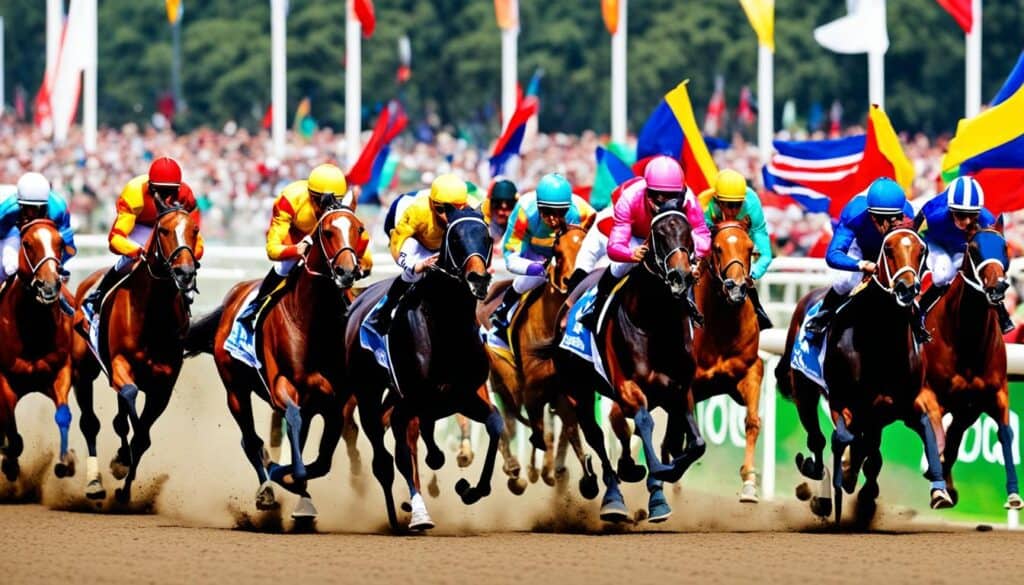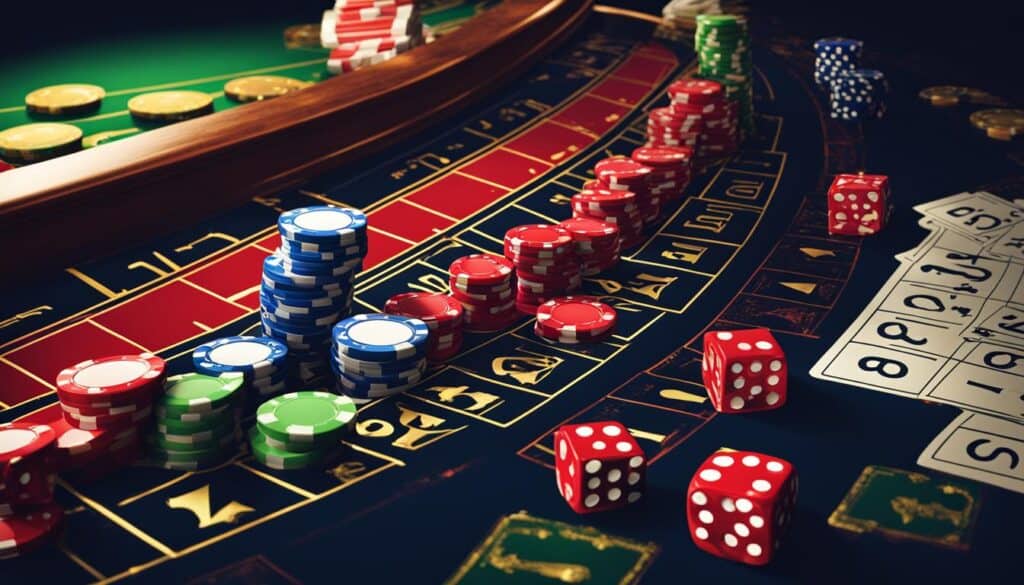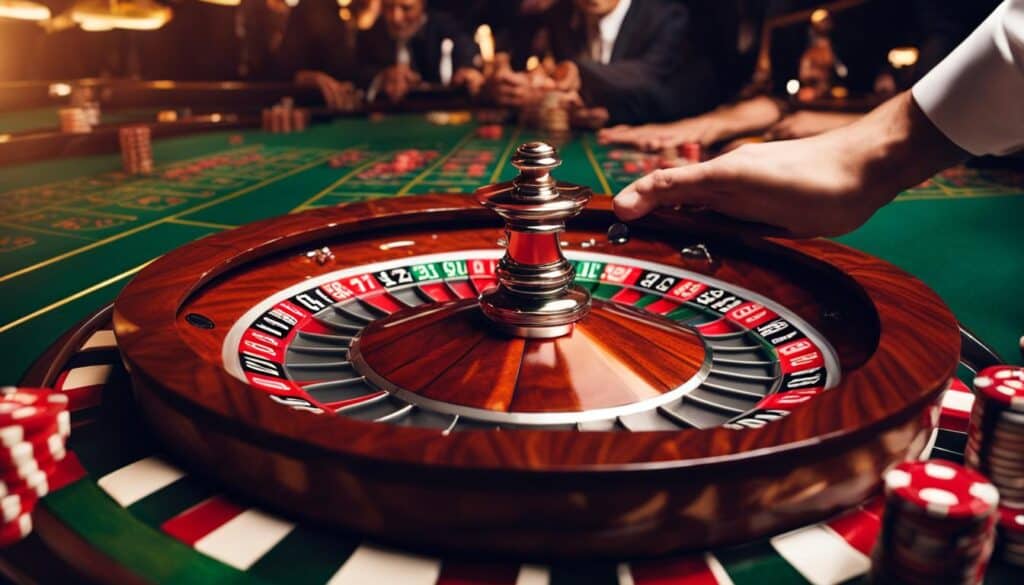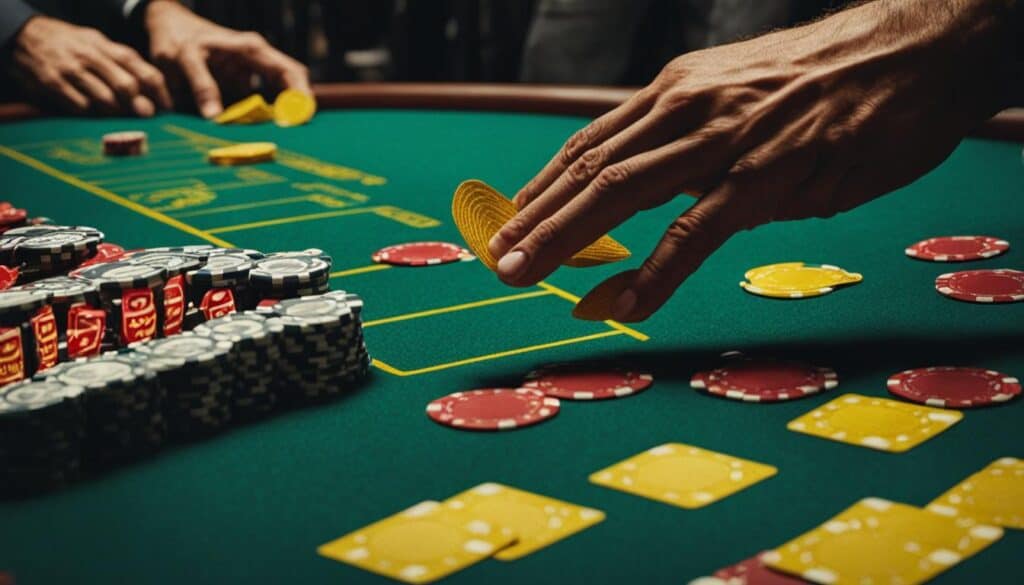What is gambling? Gambling is a widely popular activity that involves wagering something of value, such as money or possessions, on the outcome of an event that is partially or entirely determined by chance. It has been a form of entertainment and social interaction for centuries, enjoyed by individuals across cultures, generations, and socioeconomic backgrounds. From ancient civilizations to the digital age, gambling has evolved into a global phenomenon that captivates millions.
At its core, gambling is driven by the thrill of taking risks and the anticipation of potential rewards. Whether it’s participating in a friendly poker game, placing bets on a sporting event, spinning the reels of a slot machine, or entering a lottery draw, gambling offers a unique combination of excitement, strategy, and luck. For many, it serves as both a recreational activity and an opportunity to test their luck or skill.
The Different Forms of Gambling

Gambling is an age-old pastime that takes many forms, catering to a wide range of interests, skills, and preferences. From strategy-driven games to pure games of chance, the diverse world of gambling offers something to excite every type of player.
Poker
Poker is one of the most iconic and widely recognized forms of gambling, combining skill, strategy, and a touch of luck. This popular card game pits players against one another in a battle of wits, requiring patience, analytical thinking, and a strong psychological edge.
Successful poker players leverage their knowledge of probability and their ability to read opponents, making it a highly engaging and competitive experience. Whether played in casinos, tournaments, or friendly games, poker remains a favorite among gambling enthusiasts.
Horse Racing

Horse racing has long been associated with the glamour and excitement of gambling. This beloved sport, especially popular in English-speaking countries, invites spectators to place bets on their chosen horses as they race toward the finish line.
The anticipation of watching a favorite horse sprint to victory, coupled with the potential for significant payouts, creates an unparalleled sense of thrill and entertainment. Events like the Kentucky Derby and the Grand National further solidify horse racing as a staple in the gambling world.
Lottery

The lottery is one of the simplest yet most widespread forms of gambling across the globe. Participants purchase tickets featuring unique numerical combinations in the hopes of matching the winning numbers drawn. With the allure of life-changing jackpots, lotteries continue to attract millions of players. From national lotteries with multi-million-dollar prizes to smaller local draws, this game of pure chance remains a symbol of hope for many.
Roulette

Roulette is a timeless casino game synonymous with elegance and suspense. Its spinning wheel and the iconic bouncing ball captivate players as they place bets on specific numbers, colors, or combinations. The game’s appeal lies in its simplicity and unpredictability, as the outcome depends entirely on luck. Whether played in lavish casino settings or online platforms, roulette remains a quintessential gambling experience for enthusiasts worldwide.
Sports Betting

Sports betting has become one of the most popular and dynamic forms of gambling, attracting fans of all sports. This form of wagering involves predicting the outcomes of sporting events such as football, basketball, tennis, and more.
From betting on a favorite team to exploring in-play wagers during live matches, sports betting enhances the viewing experience by adding an extra layer of excitement. With advancements in technology, online sports betting platforms now offer convenient ways for fans to engage in this thrilling pastime.
Gambling is a dynamic and multifaceted activity that has captivated individuals for centuries, offering an array of experiences to suit diverse preferences and interests. At its core, gambling involves wagering money or valuables on events with uncertain outcomes, blending chance, skill, and excitement. Whether you’re intrigued by the strategic nuances of poker, the fast-paced action of horse racing, or the life-altering jackpots of the lottery, gambling offers something for everyone.
For those who appreciate elegance and tradition, games like roulette provide a timeless charm, while sports betting delivers a competitive edge, allowing enthusiasts to engage deeply with their favorite teams and players. These various forms of gambling not only entertain but also contribute significantly to the global entertainment industry, creating an environment where strategy, chance, and thrill intersect.
Understanding what is gambling goes beyond the surface—it encompasses its cultural, social, and economic dimensions, highlighting its integral role in shaping modern entertainment. From casual participants to seasoned players, gambling continues to evolve, offering endless opportunities for enjoyment and engagement.
Understanding Gambling Odds and Mathematics
What is gambling? At its core, gambling is more than just a game of chance; it is a calculated combination of strategy, probability, and mathematics. Whether you’re engaged in poker, betting on horse racing, or exploring other gambling activities, understanding the odds and mathematical principles behind each game can significantly influence your success. By mastering these concepts, you can make informed decisions, manage risks effectively, and enhance your overall gambling experience.
The Role of Probability in Poker
Poker is an excellent example of how gambling heavily relies on mathematics and probability. A deep understanding of odds provides a substantial advantage at the table. For instance, knowing the probability of specific hands or card combinations allows you to assess your chances of winning in any given situation.
This insight helps you make strategic decisions, such as when to raise, fold, or call. Seasoned poker players leverage probability to outmaneuver their opponents, crafting calculated moves that maximize their gains while minimizing unnecessary risks. Mastering these mathematical principles is key to transforming poker from a game of luck into a game of skill.
Gambling Mathematics in Horse Racing
Horse racing provides another avenue where gambling mathematics plays a pivotal role. Here, understanding odds is crucial for building a successful betting strategy. By analyzing factors like a horse’s track record, competition, and track conditions, you can estimate the probability of specific outcomes, such as winning, placing, or showing.
Moreover, interpreting the odds provided by bookmakers allows you to identify bets that offer the best value. This strategic approach not only helps you make informed predictions but also minimizes potential losses, making your betting experience more calculated and rewarding.
Decoding Odds in Other Gambling Formats
The concept of odds is fundamental across various forms of gambling, including roulette, blackjack, and sports betting. For example, in roulette, understanding the odds of landing on a specific number or color helps you decide between safer outside bets or higher-risk inside bets.
Similarly, in sports betting, interpreting odds enables you to evaluate potential payouts and determine the likelihood of specific outcomes. By decoding these odds, you can better balance risk and reward, empowering yourself to make smarter, data-driven decisions in any gambling scenario.
Why Mastering Gambling Odds Matters
Whether you’re a seasoned gambler or new to the scene, dedicating time to understanding gambling odds and mathematics can significantly elevate your performance. A solid grasp of probability, combined with strategic thinking, allows you to adopt a more disciplined and effective approach to gambling.
Mastering these skills not only improves your chances of success but also enhances the enjoyment and engagement of the experience. From calculating risks to spotting profitable opportunities, developing an understanding of gambling odds equips you to make informed choices.
While luck will always remain a factor, incorporating mathematics into your gambling strategy ensures that your decisions are calculated and deliberate. Over time, this knowledge can transform gambling from a game of chance into a pursuit of skill and strategy.
So, what is gambling? It is the art of merging luck with calculated risk, backed by an understanding of odds and probability. By delving deeper into gambling mathematics, you can refine your strategy, reduce unnecessary risks, and make smarter decisions. With practice, you’ll find that gambling becomes less about chance and more about informed, data-driven choices—bringing both success and satisfaction to your endeavors.
The Rise of Online Gambling

What is gambling in today’s digital age? Gambling has evolved beyond traditional casinos and betting shops, becoming a dynamic online phenomenon that offers unparalleled convenience and accessibility. In recent years, online gambling has experienced a remarkable surge in popularity, driven largely by rapid advancements in technology and the widespread adoption of digital platforms.
Online gambling encompasses a vast spectrum of activities, including virtual casinos, sports betting, poker, and interactive games. These platforms deliver an engaging and immersive experience, enabling players to enjoy the thrill of gambling from the comfort of their homes. Innovations such as cutting-edge graphics, live dealer features, and intuitive interfaces have further fueled the appeal of online gambling, transforming it into a global entertainment hub.
The Diversity of Online Gambling Platforms
One of the standout features of online gambling is its sheer diversity. For those asking what is gambling, it’s no longer limited to slot machines or card games. Online platforms provide access to an extensive selection of games, from roulette and blackjack to niche offerings like esports betting and virtual horse racing. Additionally, players can participate in international poker tournaments or place wagers on live sports events—all at the click of a button.
This variety caters to individual preferences and has become a defining characteristic of online gambling, drawing millions of players worldwide. Unlike traditional gambling venues, which may have limited offerings, online platforms are continually expanding their game libraries to meet diverse tastes and trends.
Accessibility: A Game-Changer in the Industry
Another driving force behind the rise of online gambling is its unmatched accessibility. Traditional gambling often required players to travel to physical locations, adhere to operating hours, or navigate long wait times for games. In contrast, online gambling platforms are available 24/7, allowing players to log in anytime, anywhere. This round-the-clock availability ensures that gambling is more inclusive, catering to a broader audience, including those who may not have previously had access to physical gambling facilities.
For players new to the concept, understanding what is gambling in the online context reveals how it has removed many of the barriers that once limited participation. Whether it’s early morning or late at night, anyone with an internet connection can engage in their favorite games without logistical challenges.
Emphasizing Responsible Gambling
While the rise of online gambling has introduced numerous benefits, it also highlights the importance of responsible gambling practices. For many, what is gambling without limits can lead to financial strain or addiction. Recognizing this, online platforms have implemented various tools to promote safer gambling. Features such as self-exclusion options, spending limits, and detailed account statements allow players to stay in control of their gambling activities.
Players are strongly encouraged to gamble within their means, set strict betting budgets, and remain vigilant about warning signs of addiction. For those who need help, many organizations and support services are readily available to provide guidance and assistance.
The Future of Online Gambling
The rapid evolution of technology ensures that online gambling will continue to innovate and expand. From the integration of virtual reality (VR) to blockchain-based payment systems, the future holds immense potential for redefining the gambling experience. For individuals curious about what is gambling, the digital landscape offers a safe, convenient, and endlessly entertaining environment—provided they embrace responsible gaming practices.
In conclusion, the rise of online gambling represents a transformative shift in the global gambling industry. By combining advanced technology with user-focused features, these platforms have redefined what it means to gamble in the modern era. Through responsible engagement, players can fully enjoy the excitement, diversity, and accessibility of online gambling while safeguarding their well-being.
How to Gamble Responsibly

Gambling is a form of entertainment that involves risking money or valuables in the hope of winning more. Whether you prefer visiting traditional casinos, betting on sports, or engaging in online gambling, it’s essential to understand how to gamble responsibly. Adopting responsible gambling practices not only enhances your overall experience but also minimizes potential risks. Below are effective strategies to maintain a safe and enjoyable gambling journey.
1. Set Clear Limits Before You Start
Understanding what gambling entails means recognizing its potential risks and setting boundaries. Before participating, establish both time and financial limits for your gambling activities. Decide on a budget that aligns with your disposable income and avoid exceeding it. Strictly adhering to these limits helps prevent overspending and ensures that gambling remains a recreational activity rather than a financial burden.
2. Manage Your Finances Prudently
Responsible gambling begins with smart financial management. Never use money allocated for essential expenses like rent, groceries, or bills to fund gambling activities. Instead, designate a specific portion of your discretionary income for entertainment purposes, including gambling. By separating your gambling funds from your everyday expenses, you can maintain financial stability while enjoying the activity.
3. Maintain a Healthy Mindset
What is gambling if not a test of self-discipline and decision-making? Responsible gambling requires maintaining a balanced mental state. Avoid gambling when under the influence of alcohol, feeling stressed, or experiencing emotional distress. These factors can impair judgment and lead to impulsive decisions. Regularly evaluate your gambling habits to ensure they don’t interfere with your work, relationships, or overall well-being.
4. Choose Trustworthy Gambling Platforms
If you’re exploring online gambling, selecting reputable and licensed platforms is vital. Ensure the platform complies with regulations and holds certifications from recognized gambling authorities. Trusted online casinos prioritize player safety, offer fair gameplay, and protect your personal and financial data. Researching reviews and verifying a site’s credibility can help you avoid fraudulent platforms.
5. Utilize Self-Exclusion Tools When Necessary
For individuals struggling to maintain control, self-exclusion tools offered by online gambling platforms can be invaluable. These features allow you to restrict access to gambling sites temporarily or permanently. If you feel your gambling behavior is becoming problematic, using self-exclusion tools can help you regain control and establish healthier habits.
6. Understand Gambling as Entertainment
A key aspect of responsible gambling is understanding what gambling truly represents: a form of entertainment, not a way to make money. Viewing gambling as a recreational activity rather than a financial solution can help you maintain a balanced approach. Always gamble with money you can afford to lose and avoid chasing losses, as this can lead to further financial strain.
By following these responsible gambling strategies, you can enjoy the excitement of gambling without compromising your financial security or mental well-being. Whether you’re trying your luck at a casino, placing bets online, or participating in a poker game, understanding “what is gambling” and practicing responsibility ensures a positive and sustainable experience.
The Dangers of Gambling Addiction

Gambling, at its core, involves wagering money or valuables on uncertain outcomes with the hope of a reward. However, when the thrill of gambling spirals into an uncontrollable habit, it can lead to gambling addiction, also known as pathological gambling or gambling disorder. This serious condition is characterized by an overwhelming urge to gamble despite the negative consequences it brings. Understanding what gambling addiction entails is essential to recognizing the signs and seeking timely help.
The Financial Pitfalls of Gambling Addiction
One of the most significant dangers of gambling addiction is its devastating impact on personal finances. Compulsive gamblers often chase losses, spending money they cannot afford to lose. This behavior can quickly result in mounting debts, depleted savings, and even bankruptcy. Financial ruin often becomes a harsh reality for those unable to break free from the cycle of compulsive gambling, leaving them in a state of constant financial distress.
How Gambling Addiction Affects Relationships
Beyond financial hardships, gambling addiction can severely strain relationships with family members, friends, and loved ones. The excessive focus on gambling frequently leads to the neglect of personal and social responsibilities, causing conflicts and emotional distance. Deceit, secrecy, and broken promises often accompany gambling addiction, further eroding trust and creating a significant rift in relationships.
The Toll on Mental Health
The psychological impact of gambling addiction cannot be overstated. The repeated cycle of hope, anticipation, and crushing disappointment often leads to heightened anxiety, depression, and feelings of hopelessness. The obsession with achieving the next big win can overshadow all other aspects of life, leaving individuals struggling with low self-esteem and diminished mental well-being.
Recognizing the Signs of Gambling Addiction
Recognizing the warning signs of gambling addiction is the first crucial step toward recovery. Common indicators include:
- An inability to stop gambling, even when it causes harm.
- Restlessness or irritability when trying to cut back.
- A preoccupation with gambling activities, including planning the next opportunity to bet or reminiscing about past wins.
If these signs resonate with you or someone you know, it’s important to acknowledge the problem and take action. Gambling addiction is a treatable condition, but early intervention can make a significant difference.
Treatment and Recovery: A Path to Freedom
Overcoming gambling addiction often requires a comprehensive and personalized approach. Effective treatment options may include therapy, counseling, and participation in support groups. Cognitive-behavioral therapy (CBT), for example, has proven highly effective in helping individuals reframe their thought patterns and manage the compulsive urge to gamble.
In many cases, addressing gambling addiction also involves tackling underlying mental health issues that may contribute to addictive behaviors. Conditions such as anxiety, depression, or trauma can fuel the cycle of gambling, making professional assistance critical in creating a recovery plan tailored to the individual’s needs.
Support Is Available
If you or someone you care about is struggling with gambling addiction, help is available. Reach out to helplines, addiction support groups, and specialized treatment centers for guidance and assistance. Recovery from gambling addiction is possible, and taking the first step can lead to a healthier, more balanced life.
Minimum Age for Gambling
Understanding what is gambling also involves knowing the age requirements for participating in it. The minimum legal age for gambling varies significantly based on the jurisdiction and the type of gambling activity. For example, in many countries, including the United States, the legal gambling age is either 18 or 21 years old, depending on the state and the specific form of gambling, such as casinos, sports betting, or lotteries.
Adhering to these age restrictions is essential not only to comply with the law but also to promote responsible gambling practices. These regulations are in place to protect young individuals from the potential risks associated with gambling, ensuring that participants are mature enough to make informed decisions. If you’re new to the concept of gambling, it’s crucial to check local laws to avoid unintended violations and to engage in gambling responsibly.
Gambling Etiquette

Understanding what is gambling extends beyond the act of placing bets; it also involves adhering to proper gambling etiquette. Following these guidelines ensures a respectful, enjoyable, and professional environment for everyone involved, enhancing the overall experience for all participants.
Dress Code Matters
When visiting a casino or participating in formal gambling activities, dressing appropriately is a key aspect of gambling etiquette. Many gambling establishments have specific dress codes to maintain their ambiance. Typically, smart casual attire is acceptable, but some high-end casinos may require formal wear. Familiarizing yourself with the dress code beforehand demonstrates respect for the venue and helps you blend in seamlessly.
Display Good Sportsmanship
Whether you’re experiencing a winning streak or enduring a loss, maintaining good sportsmanship is crucial. Graciously accept losses without showing frustration and avoid gloating over wins. Congratulate fellow players on their victories and contribute to a positive gaming atmosphere. Negative behaviors, such as arguing or displaying hostility, can detract from the enjoyment of others and disrupt the environment.
Respect the Rules and Regulations
A thorough understanding of the rules is an essential part of knowing what is gambling and how to participate responsibly. Every game comes with its own set of rules, and each casino or gambling establishment enforces specific policies. Take the time to familiarize yourself with these regulations to avoid misunderstandings or penalties. Following the rules promotes fair play and mutual respect among players.
Be Considerate of Others
Mindfulness of others’ comfort and space is a cornerstone of gambling etiquette. Avoid disruptive behaviors such as excessive noise, smoking in non-smoking areas, or becoming overly intoxicated. Being considerate of your fellow players ensures a pleasant atmosphere for everyone, allowing all participants to focus on their game without unnecessary distractions.
Why Etiquette Matters in Gambling
Good etiquette is an integral part of understanding what is gambling beyond the technicalities of placing wagers. By following these guidelines, you contribute to an environment of mutual respect and professionalism, which enhances the overall gambling experience for both yourself and others.
Remember, what is gambling isn’t just about the games—it’s about the shared experience. Respect for the venue, the rules, and fellow players is key to making every gambling experience enjoyable and memorable.
The Secrets of Effective Gambling

To truly understand what is gambling, one must grasp the critical role that odds and probability play in shaping outcomes. Gambling is not purely a game of chance but a strategic endeavor that requires careful analysis, informed decision-making, and a solid grasp of the mathematics behind the odds. By mastering these principles, players can enhance their overall experience and potentially improve their chances of success.
Understanding Gambling Odds: The Key to Strategic Play
At its core, what is gambling if not a calculated interaction with odds and probability? Odds are a numerical representation of the likelihood of an event occurring and dictate the potential payout of a bet. They serve as the foundation for evaluating the value and risk of any wager. These odds are typically presented in three main formats, each suited to different types of gambling:
- Decimal Odds:
Commonly used in Europe and Australia, decimal odds express the total payout, including the original stake. For example, if the odds are 2.50, a $10 wager would result in a $25 return ($15 profit plus the original $10 stake). - Fractional Odds:
Predominantly seen in the UK, fractional odds showcase the ratio of profit to the stake. For instance, odds of 2/1 mean that for every $1 wagered, the bettor stands to gain $2 in profit, receiving a total of $3 when including the stake. - Moneyline Odds:
Popular in the United States, moneyline odds can initially appear more complex. Positive moneyline odds (+200) represent the profit on a $100 wager, while negative moneyline odds (-150) indicate how much must be bet to win $100.
The Role of Probability in Gambling Success
An essential part of what is gambling is understanding how probability influences odds. Higher probabilities of an event occurring correspond to lower odds (and lower payouts), whereas lower probabilities come with higher odds (and potentially greater rewards). For example, betting on a heavy favorite in sports will yield smaller returns compared to wagering on an underdog with a less likely outcome.
To maximize their potential for success, savvy gamblers analyze odds to identify bets that offer favorable risk-to-reward ratios. This process often involves assessing implied probabilities and determining whether the odds accurately reflect the likelihood of an event. Online odds calculators and software tools can assist with these calculations, making the process more accessible even for novice players.
Strategies for Making Informed Bets
Effective gambling requires more than a basic understanding of odds. It’s about applying that knowledge to real-world situations to make calculated decisions. Here are key strategies for success:
- Analyze the Risk: Weigh the potential rewards against the risks of each wager. Avoid high-risk bets unless they align with your budget and goals.
- Focus on Value: Look for bets where the odds underestimate the true probability of the event occurring. This is often referred to as “value betting.”
- Use Tools and Resources: Leverage online tools to calculate odds, compare betting lines, and gather insights about potential outcomes.
Responsible Gambling: A Balanced Approach
At its essence, what is gambling if not a form of entertainment? While strategic play can increase your chances of success, it’s vital to approach gambling responsibly. Set clear limits on how much time and money you spend, and avoid chasing losses. Gambling should remain an enjoyable activity, not a financial burden.
By understanding the principles of odds, probability, and risk assessment, players can elevate their gambling experience while maintaining control over their actions. Remember, gambling is not about guaranteed wins but about making informed and enjoyable choices.
The Role of Luck in Gambling

What is gambling? At its core, gambling is an activity with uncertain outcomes where individuals place bets in hopes of achieving a favorable result. One of the most compelling aspects of gambling is the role that luck plays in the process. While skill and strategy can influence certain outcomes, luck remains the dominant factor that ultimately determines success.
From spinning the roulette wheel to drawing cards in poker or betting on a sports event, every form of gambling is inherently tied to chance. This unpredictable element introduces an exciting dynamic that captivates players, making gambling both thrilling and uncertain. Even seasoned gamblers who rely on strategies and techniques to improve their odds recognize that luck is an indispensable part of the equation.
The uncertainty in gambling is what differentiates it from other forms of entertainment or commerce. Unlike calculated investments or predictable activities, gambling thrives on unpredictability. This thrill of the unknown—of potentially winning big or losing it all—is what keeps players coming back for more. It is this blend of anticipation and excitement that defines what gambling truly is.
Balancing Luck and Skill in Gambling
A famous quote by Seneca states, “Luck is what happens when preparation meets opportunity.” While luck in gambling is largely out of one’s control, players can improve their chances of success through preparation and understanding. Learning the rules, analyzing the odds, and developing strategic approaches are steps that can help mitigate the reliance on pure chance.
Take poker, for instance—a game that uniquely combines skill and luck. While skilled players can exploit opponents’ weaknesses, make calculated decisions, and bluff effectively, the distribution of cards remains random. Even the most strategic poker players cannot entirely escape the influence of luck, which underscores its critical role in determining outcomes.
Similarly, in games like blackjack or sports betting, informed decisions can influence results to some degree. However, no amount of preparation can completely remove the unpredictable nature of gambling. This balance between skill and chance makes gambling an intriguing activity that blends calculated risks with serendipity.
The Importance of Perspective in Gambling
Understanding what gambling entails also means recognizing the role of luck and maintaining a balanced perspective. Whether you are an experienced gambler or someone new to the world of gambling, embracing the element of chance is essential to enjoying the experience responsibly. Gambling is not solely about the pursuit of monetary gain; it is also about the excitement and entertainment it provides.
Responsible gambling begins with informed decision-making. Recognizing that you cannot control every outcome allows you to approach gambling with realistic expectations. This perspective helps mitigate frustrations when luck does not favor you and enhances the enjoyment of the activity as a form of recreation rather than a means to guarantee financial success.
What is gambling? It is a mix of skill, strategy, and, above all, luck. While luck introduces the unpredictability that defines gambling, preparation and understanding can enhance your enjoyment and potentially improve your odds. Whether it’s the thrill of spinning a roulette wheel or the calculated risks in poker, gambling’s unique allure lies in its ability to balance chance with strategy. Remember to embrace the unpredictability, gamble responsibly, and enjoy the excitement of the journey, as that is the essence of what gambling truly is.
Understanding Common Gambling Fallacies

Gambling is a game of chance that involves risking something of value in hopes of winning a reward. While the allure of gambling can be exciting, it is often accompanied by widespread fallacies and misconceptions that can lead to poor decision-making. To approach gambling with a rational mindset, it is vital to understand these fallacies and how they impact behavior. Two of the most common misconceptions are the “Gambler’s Fallacy” and the “Gambler’s Conceit.”
The Gambler’s Fallacy
The Gambler’s Fallacy is the mistaken belief that past outcomes influence future results in games of chance. This cognitive bias leads players to think that a specific outcome is “due” after a series of opposite results. For instance, if a roulette wheel lands on black five times in a row, some gamblers might irrationally believe that red is more likely to appear next. However, in reality, each spin of the roulette wheel is an independent event, unaffected by prior spins.
This misconception often arises because players fail to grasp the concept of statistical independence. Games such as roulette, dice, or slot machines operate on random probability, where the odds remain constant regardless of previous outcomes. Believing otherwise can lead to risky behaviors, such as increasing bets under the assumption that a win is inevitable.
The Gambler’s Conceit
The Gambler’s Conceit refers to the false confidence that a player can quit gambling while still ahead. This fallacy frequently manifests during winning streaks when a gambler feels they have “figured out” the game or believe their luck will persist indefinitely. However, gambling outcomes are dictated by randomness, not skill or predictive ability, in most cases.
This flawed mindset can lead players to overestimate their control over the game, causing them to continue gambling longer than intended. Eventually, the house edge—a built-in advantage for casinos or betting operators—takes its toll, eroding winnings. Recognizing the influence of probability and avoiding overconfidence is crucial for maintaining a rational approach to gambling.
Why Understanding These Fallacies Matters
So, what is gambling without an awareness of its psychological traps? Gambling thrives on the excitement of risk and reward, but it is ultimately a game of chance governed by luck and probability. Misconceptions like the Gambler’s Fallacy and Gambler’s Conceit can cloud judgment, leading to unrealistic expectations and financial losses.
By identifying these fallacies, players can make informed decisions and set realistic boundaries before engaging in gambling activities. Remember, understanding the true nature of gambling is not just about winning or losing—it’s about managing expectations and recognizing the role of chance.
The Influence of Casinos and Gambling Houses

Gambling, a pastime that has fascinated individuals for centuries, involves wagering money or valuables on an event with an uncertain outcome in hopes of gaining a greater reward. One of the most prominent venues for gambling is the casino, a space dedicated to offering a wide range of gambling activities. From the bustling energy of Las Vegas to the refined elegance of Monte Carlo, casinos and gambling houses hold a unique place in global entertainment culture.
Casinos and gambling houses offer an extensive variety of games designed to captivate and entertain players. Classic games such as roulette, blackjack, and slot machines are perennial favorites, drawing both experienced gamblers and curious newcomers. The immersive environment of casinos—with their flashing lights, lively sounds, and luxurious decor—creates a sensory-rich experience that heightens the thrill of gambling.
One key aspect of gambling in casinos is the concept of the “House Edge.” This built-in mathematical advantage ensures that the casino remains profitable over time. While individual players may enjoy occasional wins, the House Edge guarantees that the odds are ultimately stacked in favor of the establishment. Understanding this principle is essential for anyone asking, “What is gambling?” as it highlights the balance between luck and probability in these games.
Despite the House Edge, the appeal of gambling remains strong. Casinos are more than just gaming venues—they are social hubs where people gather to relax, test their luck, and enjoy a wide range of amenities. Many modern casinos offer fine dining, live entertainment, and even luxurious accommodations, elevating the overall experience beyond the games themselves. This combination of excitement and indulgence keeps gamblers returning time and again.
In recent years, technological advancements have significantly reshaped the gambling landscape. Online casinos have surged in popularity, offering players the ability to enjoy their favorite games from the comfort of their homes. Platforms provide an extensive selection of games, from virtual slot machines to live dealer experiences that replicate the feel of a physical casino. This evolution has made gambling more accessible, attracting a broader audience while transforming how people perceive and engage with it.
However, whether gambling in a traditional casino or online, it is critical to approach it responsibly. Setting clear limits, managing a bankroll wisely, and adhering to responsible gambling practices can help ensure that this form of entertainment remains enjoyable and does not lead to financial or emotional harm.
Understanding what is gambling involves more than just learning the mechanics of games; it includes recognizing the social, economic, and personal implications of this age-old activity. Whether in a glamorous casino or through an online platform, gambling continues to be a source of excitement, entertainment, and fascination for millions worldwide.
Identifying and Understanding Gambling Tells

In its simplest form, gambling involves taking calculated risks in hopes of achieving a desired outcome, often in games of chance or skill. Within the realm of gambling, an intriguing aspect that often goes unnoticed by beginners is the concept of “gambling tells.” These subtle, often unintentional cues can provide valuable insights into a player’s intentions, emotional state, or the strength of their hand. Understanding what gambling is extends beyond the mechanics of the games themselves—it’s also about recognizing the psychological nuances that can sway outcomes in competitive settings.
What Are Gambling Tells?
Gambling tells are subtle signs players give off—whether through body language, facial expressions, verbal cues, or betting behavior. These tells can inadvertently reveal a player’s confidence, strategy, or attempts to bluff. Learning to identify and interpret these signals gives skilled gamblers a significant advantage, especially in games like poker, where reading opponents is as critical as playing the cards.
Some of the most common gambling tells include:
- Facial Expressions: Brief microexpressions, rapid eye movements, or even subtle changes in facial color can provide clues about whether a player is confident or anxious about their hand.
- Body Language: Actions such as fidgeting, leaning back, crossing arms, or tapping fingers may indicate nerves, insecurity, or even attempts to appear relaxed while bluffing.
- Betting Patterns: Sudden shifts in betting habits, inconsistent techniques, or unusually high bets often correlate with the strength—or weakness—of a player’s hand.
- Verbal Cues: The tone of voice, pauses in speech, or even specific word choices can unintentionally give away a player’s emotions or strategy.
Why Are Gambling Tells Important?
For those wondering what is gambling and what makes it so dynamic, gambling tells are a key component. They add a psychological layer to games, especially in face-to-face environments. Recognizing and decoding these tells allows players to anticipate opponents’ moves, assess the likelihood of a bluff, or decide whether to fold or raise.
However, interpreting tells requires a combination of sharp observation and experience. Not all tells are reliable, and seasoned players sometimes employ reverse tells—deliberately sending false signals to mislead opponents. Therefore, successful players analyze tells in the context of the game, combining them with other factors like game flow and individual tendencies.
Utilizing Gambling Tells in Poker
Poker, often regarded as the quintessential game of skill in gambling, places a high premium on reading opponents. In poker, understanding and exploiting gambling tells can drastically improve decision-making and overall performance.
For example, a player nervously tapping the table while avoiding eye contact might be bluffing. Conversely, a confident smile coupled with a sudden change in posture could indicate a strong hand. The ability to notice such details, correlate them with past behavior, and act accordingly can create a strategic advantage.
Still, it’s important to remember that gambling tells are not foolproof. Misreading a tell can lead to costly mistakes, which is why seasoned players remain cautious and avoid basing decisions solely on one signal. Instead, they use tells as part of a broader strategy, considering all available information before making a move.
Mastering the Art of Reading Gambling Tells
Mastering the art of identifying gambling tells requires patience, keen observation, and consistent practice. Experienced players often dedicate time to studying their opponents’ habits, noting patterns and deviations from their usual play style. By doing so, they gain a deeper understanding of the psychological aspects of what is gambling, elevating their gameplay from mere chance to a calculated art form.
Ultimately, the ability to read and interpret gambling tells is a skill that enhances the thrill and unpredictability of gambling. It exemplifies the unique blend of strategy, psychology, and intuition that makes gambling such a captivating experience. Whether you’re a novice or a seasoned player, honing this skill can provide a crucial edge in the high-stakes world of gambling.
Seeking Help for Gambling Addiction

Understanding what is gambling and its potential consequences is essential when addressing the challenges posed by gambling addiction. Gambling is a widespread activity that involves wagering money or valuables on uncertain outcomes, typically for entertainment. However, for some individuals, gambling can escalate into a serious addiction, negatively impacting their mental health, relationships, and financial stability. For those struggling, seeking professional help is a critical step toward recovery.
One highly effective resource for individuals battling gambling addiction is Gamblers Anonymous (GA). This support group offers a confidential and nonjudgmental environment where individuals can share their experiences, challenges, and progress. By engaging in group discussions, members gain emotional support, practical advice, and encouragement from others who understand their struggles. Gamblers Anonymous follows a structured 12-step program designed to guide individuals through their recovery journey and help them rebuild their lives.
In addition to support groups, therapy and counseling are invaluable tools for addressing gambling addiction. Licensed therapists, particularly those trained in treating compulsive behaviors, can help individuals explore the root causes of their gambling habits. Through cognitive-behavioral therapy (CBT), individuals can identify and challenge distorted thinking patterns, develop healthier coping strategies, and learn techniques to resist cravings and manage triggers effectively. Counseling also fosters self-awareness, helping individuals understand the impact of their gambling on themselves and others.
For those requiring more intensive support, specialized treatment programs for gambling addiction are available. These programs often provide a comprehensive, holistic approach to recovery, combining individual therapy, group counseling, and educational workshops. Participants are guided through strategies to rebuild their financial stability, repair relationships, and cultivate a healthier lifestyle. Many programs also address co-occurring issues, such as anxiety, depression, or substance abuse, which often accompany gambling addiction.
Recognizing what is gambling and how it can transform from a harmless pastime into a harmful addiction is the first step in seeking help. Whether through support groups like Gamblers Anonymous, therapy, or specialized recovery programs, resources are available to empower individuals on their path to overcoming gambling addiction. With the right help and determination, it is possible to break free from the cycle of addiction and regain control of one’s life.
Responsible Gambling Measures
Responsible gambling plays a key role in ensuring a positive and enjoyable experience for anyone participating in gambling activities. Understanding and implementing responsible gambling strategies can help individuals maintain control over their habits while reducing the risk of potential negative outcomes. Below are essential measures to encourage responsible gambling behavior:
1. Set Personal Limits
Establishing clear limits on both the time and money spent on gambling is critical. By defining these boundaries, individuals can prevent gambling from becoming excessive or harmful. For instance:
- Time Limits: Decide in advance how much time you’ll dedicate to gambling and stick to it.
- Financial Limits: Set a budget for gambling activities and avoid exceeding it, even during winning streaks.
These practices ensure gambling remains a form of entertainment and doesn’t interfere with financial stability or personal well-being.
2. Take Regular Breaks
Continuous gambling sessions can lead to fatigue, clouded judgment, and impulsive decision-making. To counteract this, taking frequent breaks is essential. Stepping away from the activity provides an opportunity to:
- Reassess choices and maintain a clear perspective.
- Restore focus and energy.
By scheduling breaks, individuals can maintain a healthy balance and enjoy gambling responsibly.
3. Seek Support When Needed
If gambling begins to cause distress or negatively impact other aspects of life, it’s important to seek help promptly. A variety of resources are available, including:
- Helplines: Confidential and professional assistance tailored to gambling concerns.
- Support Groups: Communities where individuals can share experiences and learn from others facing similar challenges.
- Counseling Services: Professional guidance to address underlying issues and develop healthier habits.
These resources provide valuable support to regain control and build a sustainable relationship with gambling.
Responsible Gambling
The foundation of responsible gambling is maintaining the focus on enjoyment and entertainment. By staying aware of gambling habits and adhering to measures like setting limits, taking breaks, and seeking help when necessary, individuals can minimize risks and foster a healthy, balanced approach to gambling.
What is gambling if not a form of leisure? When approached responsibly, it remains a fun and engaging activity without the potential harm of addiction or financial strain. Adopting these practices ensures gambling remains a positive part of life.
Life Beyond Gambling
Understanding what is gambling and its impact on life is the first step in overcoming its grip. Gambling can become more than just a pastime—it can evolve into a destructive addiction that affects relationships, finances, and overall well-being. However, life beyond gambling addiction is not only possible but can also be deeply rewarding. It’s a journey of rebuilding, rediscovery, and creating a life filled with purpose and joy.
Rebuilding Relationships and Emotional Health
One of the key aspects of moving past gambling addiction is mending relationships with loved ones. Gambling often causes trust issues and emotional strain within families and friendships. Open communication, seeking forgiveness, and demonstrating consistent efforts to change can gradually restore trust and connection. Emotional well-being also plays a critical role. Addressing feelings of guilt, shame, or anxiety requires self-compassion and, in many cases, professional guidance.
The Importance of Professional Help
For many, understanding what is gambling involves recognizing its addictive potential and the deeper issues driving the behavior. Seeking support from qualified therapists or addiction counselors is a vital step in the recovery process. Professionals can help individuals identify triggers, explore the root causes of their addiction, and develop healthier coping mechanisms. Therapy options, such as cognitive-behavioral therapy (CBT), have proven effective in helping people regain control over their thoughts and actions. Joining support groups like Gamblers Anonymous also provides a sense of community and shared understanding.
Rebuilding Financial Stability
Recovering from gambling addiction often involves addressing the financial challenges that come with it. Developing strong financial habits can empower individuals to regain control over their lives. This includes creating a realistic budget, prioritizing debt repayment, and building a savings plan for the future. For those overwhelmed by financial losses, consulting a financial advisor can provide clarity and guidance.
Filling the Void Left by Gambling
Breaking free from gambling requires filling the void it leaves behind. Exploring new hobbies, interests, and social activities can bring a sense of fulfillment and purpose. Whether it’s taking up a sport, learning a new skill, or engaging in creative pursuits, these activities can serve as positive outlets for energy and focus. Volunteering and giving back to the community can also help individuals find meaning and strengthen their sense of self-worth.
A Journey of Patience and Growth
The road to a fulfilling life beyond gambling is rarely linear. There may be setbacks and challenges along the way, but persistence and a positive mindset are key. Celebrating small victories and staying committed to long-term goals can make the process more manageable. Remember, overcoming gambling addiction is not about perfection—it’s about progress.
By understanding what is gambling, seeking professional support, rebuilding finances, and embracing new opportunities, individuals can break free from the cycle of addiction. With time, patience, and determination, it is possible to heal, rebuild, and create a brighter, more fulfilling future.
 Online Gaming Circuit
Online Gaming Circuit




